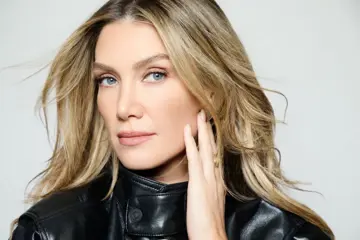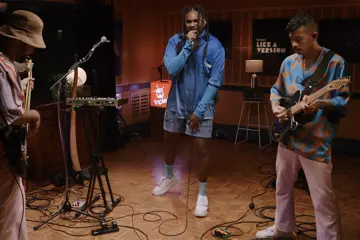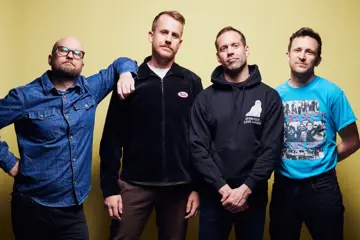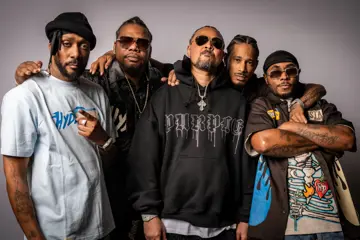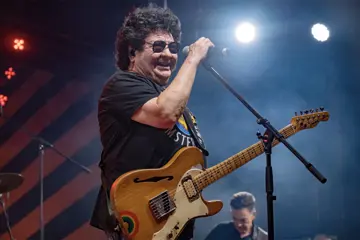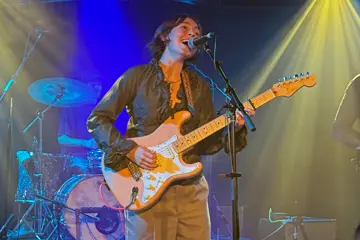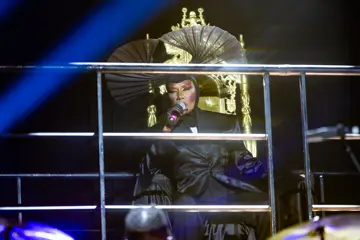 Gwenno
GwennoIn 2018, Gwenno – 37-year-old Gwenno Saunders – released her second album, Le Kov. It was psychedelic synth-pop, easily accessible to fans of Jane Weaver, Broadcast or Stereolab. But it was also sung entirely in Cornish, a Brittonic language that went extinct as a first language in the late 18th century, and is now spoken by only around 3,000 people. Rather than limiting the album’s appeal, though, the uniqueness of its language piqued interest.
“It’s quite a good conversation starter,” Saunders says, from her home in Cardiff. In turn, a Gwenno interview is, indeed, a conversation; her music the starting point for a conversation full of big ideas about the world.
Making an album sung in Cornish was, for Saunders, “always something [she’d] wanted to explore”. She was “given the gift” of her two ‘other’ languages, Cornish and Welsh, through her parents, linguists who met at Oxford, her father studying Celtic, her mother studying Welsh. “It was actually a really keen interest of theirs,” Saunders recalls. “It wasn’t: ‘Oh, we’re just like this and we always have been and we’ve always been from here.’ That’s not my background. My family’s from all over Britain and Ireland. [But] I only spoke Welsh and Cornish at home growing up, I never spoke English.”
Being trilingual in a country where most people only speak one language has long been part of Saunders sense of self-identity, something that, she realises, has been a huge influence on her life. “I’m always battling with that idea: I could’ve been born anywhere, spoken any language, so how is it that I’ve ended up here, and been given these three languages?
Don't miss a beat with our FREE daily newsletter
“My own experience [with each] has a lot to do with what the status of a language is, and what the purpose of a language is. For example, because there are so few people who speak Cornish, I generally feel very close to the people I speak Cornish with, because my experience of Cornish is family.”
Each language, she thinks, in a linguist’s way, has “its own identity, because it’s been on a journey”. Saunders has sung in all three. She first struck out with English indie-pop girl group The Pipettes; she the only member, in their rotating cast, to perform on both the band’s LPs, 2006’s We Are The Pipettes and 2010’s Earth Vs The Pipettes. Since that band’s demise, her solo career – where she’d always sung in English, Welsh, and Cornish – went from the sideline to her main thing. On her debut Gwenno album, the sci-fi-themed concept record 2015’s Y Dydd Olaf, she sung largely in Welsh.
Using different languages, Saunders is out to explore the different characteristics, and qualities, of each. Writing in Cornish, for Le Kov, felt liberating. “Obviously, it sounds different, and there are fewer Cornish language songs; there is an amazing body of work, but it’s very small. The landscape is just emptier, so there’s more room for you to explore, and try different things,” she says. “When you’re exploring things through making music, it’s always nice to have new ideas that you’re excited about. It’s a pot of gold of history and culture.”
The sound of the language itself influenced the sound of the music. “Cornish is a darker sounding language. There’s a lot of Zs, a lot of Ks, harder sounds. Maybe this is a romantic projection of mine, but I’m really attached to the idea that the language reflects the landscape. When I think of Cornwall, I think of a very rugged, very windswept, very hard landscape, and, to me, Cornish sounds like that.”
“Preserving these things is not a nice pastime, something to be taken lightly – it’s a fight, a struggle, something that seems necessary to the human race’s survival.”
Working with her husband Rhys Edwards, who serves as producer and contributed arrangements, Saunders found herself having to explain to him what a song was actually about, what its mood was. She wanted the “sonic landscapes” of Le Kov to evoke “ancient Britain, this very green, wooded environment”. The lyrics, in turn, were out to interrogate deep history, and the journey of this language and its attendant culture. “[The album] is exploring the history of the Cornish language, and also points in Cornish history,” Saunders says. “There’s a lot of historical reference in there. Mostly because I felt this wasn’t a story I’d heard through music.”
So, songs talk about historical events, such as the Prayer Book Rebellion of 1549, which protested the English reformation creating a common theology in a singular language, with Cornish being completely marginalised. This came half a century after a 1497 uprising against taxes being raised, by Henry VII, to fight against Scotland. “[People] marched on Blackheath in London, and ended up being killed; it was like a slaughter of Cornish speakers, about a thousand Cornishmen were murdered. There’s a song on this record called Den Heb Taves, which means, ‘A man without his tongue.’ It’s an old phrase from Cornish, essentially meaning, ‘A man who’s lost his tongue has lost his land.’”
Rather than being just an exercise in distant history, a work of folksy revivalism, Le Kov – and its position in the greater musical marketplace – speaks of great themes of cultural displacement, the death of small languages, and the growing rise of a global monoculture that’s dissociating people from place.
“Both Le Kov and [Y Dydd Olaf] are about that: the homogenisation of culture and language and music, and how it’s the death of the human race,” Saunders says. “Preserving these things is not a nice pastime, something to be taken lightly – it’s a fight, a struggle, something that seems necessary to the human race’s survival.”
“Naturally I’m anti-imperialist, because I come from cultures that have been oppressed. One of the Cornish revivalists, Robert Morton Nance, in comparing cultures with nature, said that a meadow needs to be varied to thrive. If you just had one type of tree or one type of flower across the earth, then the earth would die. Just as monoculture is a disaster environmentally, monocultural and monolingual is a disaster for humankind in the same sense. So much of the way that we treat the environment comes from living in a society that tries to homogenise everything – not just culture, or human beings, but the whole planet... We’ve got a strong connection with nature, [but] that connection is being severed. So much, within a late capitalist society, we define the value of language and culture as something that needs to be able to be monetised. I’m in complete disagreement with that, of that being any value marker.”
Music, of course, is the counter to this: something that can cross lines of language and culture, and create an acceptance and embrace of diversity. Of course, the opposite can be true: pop music’s indivisibility from the machinery of capitalism “driving the propagation of music that’s not necessarily good for you”.
Saunders thinks that’s why many listeners are drawn to her albums, listening to records in tongues they can’t understand. “I find it so enriching, myself, to listen to music where I don’t speak the language, because all that music really is, is a feeling. What it really communicates is the emotion of it. It’s a good thing the more variety that we have. The more varied music you get to listen to, the better it is for you. It’s like having a varied diet.”



